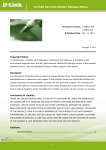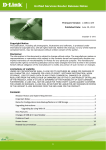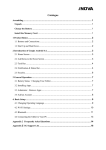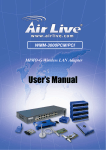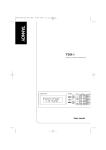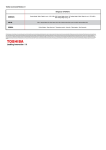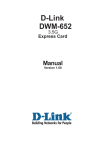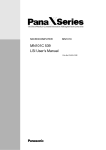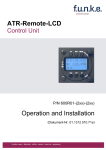Download Unified Services Router Release Notes - D-Link
Transcript
Unified Services Router Release Notes Firmware Version: 1.09B32_WW Published Date: Mar 21, 2014 Copyright © 2014 Copyright Notice This publication, including all photographs, illustrations and software, is protected under international copyright laws, with all rights reserved. Neither this manual, nor any of the material contained herein, may be reproduced without written consent of the author. Disclaimer The information in this document is subject to change without notice. The manufacturer makes no representations or warranties with respect to the contents hereof and specifically disclaim any implied warranties of merchantability or fitness for any particular purpose. The manufacturer reserves the right to revise this publication and to make changes from time to time in the content hereof without obligation of the manufacturer to notify any person of such revision or changes. Limitations of Liability UNDER NO CIRCUMSTANCES SHALL D-LINK OR ITS SUPPLIERS BE LIABLE FOR DAMAGES OF ANY CHARACTER (E.G. DAMAGES FOR LOSS OF PROFIT, SOFTWARE RESTORATION, WORK STOPPAGE, LOSS OF SAVED DATA OR ANY OTHER COMMERCIAL DAMAGES OR LOSSES) RESULTING FROM THE APPLICATION OR IMPROPER USE OF THE D-LINK PRODUCT OR FAILURE OF THE PRODUCT, EVEN IF D-LINK IS INFORMED OF THE POSSIBILITY OF SUCH DAMAGES. FURTHERMORE, D-LINK WILL NOT BE LIABLE FOR THIRD-PARTY CLAIMS AGAINST CUSTOMER FOR LOSSES OR DAMAGES. D-LINK WILL IN NO EVENT BE LIABLE FOR ANY DAMAGES IN EXCESS OF THE AMOUNT D-LINK RECEIVED FROM THE END-USER FOR THE PRODUCT. Content: Revision History and System Requirement:............................................................................... 2 Important Notes: ....................................................................................................................... 2 Notes for Configuration Auto-Backup/Restore in USB Storage ................................................. 3 Upgrading Instructions: ............................................................................................................. 3 Upgrading by using Web-UI ............................................................................................ 3 New Features: ............................................................................................................................ 4 Changes of MIB & D-View Module: ........................................................................................... 5 Problems Fixed: ......................................................................................................................... 5 Known Issues: ............................................................................................................................ 7 Related Documentation: ............................................................................................................ 7 1 Unified Services Router Release Notes Revision History and System Requirement: Firmware Version Region Date Model 1.09B32_WW WW Mar 21, 2014 DSR-150N DSR-150 HW Version A2 A1, A2 1.05B64_WW WW Nov 15, 2013 DSR-150N A2 1.08B44_WW WW Nov 15, 2013 DSR-150 A1, A2 1.08B29_WW WW May 28, 2013 DSR-150 A1,A2 1.05B50_WW WW May 10, 2013 DSR-150 A2 1.05B48_WW WW Nov 20, 2012 DSR-150N A2 1.05B46_WW WW Sep 14, 2012 DSR-150 A1 1.05B35_WW WW July 29, 2012 DSR-150 A1 1.05B29_WW WW Jun 1, 2012 DSR-150 A1 Important Notes: 1. The firmware of DSR-150 is bound to the hardware. It means that the firmware designed for A2 only can be used for A2 hardware while A1 only for A1. If you upgrade a firmware on a mismatched hardware, e.g. load A2 firmware on the A1 hardware, accidently, it may cause unexpected errors. So, please don’t do it. 2. For DSR-150, we did firmware structure optimization on 1.05B46, so 1.05B46 is a necessary and inevitable intermediate build for latter firmware. If you are using a firmware older than 1.05B46 on DSR-150, please upgrade your firmware to 1.05B46 first. If you skip this step, your devices may crash after device reboot. 3. All DSR routers with WW version are not allowed to install RU firmware image in order to prevent unnecessary misunderstanding for customers. 4. Microsoft Windows XP has some well-known limitation to access USB storage of DSR router, D-Link provides a Registry Script file named: WinXP.reg which can solve limitation of Windows XP environment. Without applying this script file, it cannot copy file from Windows XP to USB storage. (This issue will not happen when copy file from USB storage to Windows XP.) 5. For any firmware downgrade situation, i.e. from a newer version to an older one, it will take more time to restart system comparing to firmware upgrade, i.e. from an older version to a newer one. If you MUST execute firmware downgrade for your own reasons, please allow DSR more time to reboot system. It will take around 3 minutes at least for this case. 6. DHCP reserved IP feature is changed to support “inside DHCP IP pool range” in order to meet common behavior in networking industry. Old DHCP reserved IP entries will still be valid. When creating a new DHCP reserved IP, it has to follow newer behavior. 7. Now we support following 3G dongles on DSR 150N series: D-Link: DWM-152 A1, DWM-156 A1/A3/A5/A6/A7, DWM-157 A1/B1 and DWM-158 D1 HUAWEI: E1550, E173, EC306 and E303 2 Unified Services Router Release Notes 8. Before plug DWM-152/156/157/158 3G USB dongle, please make sure the SIM Card is NOT set PIN code. 9. To authenticate SSL VPN users through external databases including RADIUS, LDAP, AD and POP3, admin must also need to create user accounts with the same username and password in the local user database. Notes for Configuration Auto-Backup/Restore in USB Storage D-Link DSR router series support configuration backup or restore automatically while a USB drive is inserted. Following information instructs what condition will perform backup/restore. 1. The router configuration will be automatically backed up to the USB drive as soon as the USB drive is inserted. The back name has format <Model Name>_<Serial Number>.cfg provided this USB drive doesn’t have a backup configuration file from a DSR router already present. 2. The configuration in the USB drive can be updated if the user manually clicks ‘Save Settings’ in any GUI page and provided the Model Number and the Serial Number of the router matches with the file already present in the USB drive. 3. In case of reboot, the router checks for the presence of configuration file (with format ModelName_SerialNumber.cfg). If found, the configuration from the USB drive is restored on the router. 4. The USB drive can have only one configuration with the above mentioned format for each model name. 5. If the USB drive is plugged in to the router which is in factory default state, then during reboot, no backup is taken since no custom configuration file exists in the router by that time. The custom configuration is stored on the USB drive once the user clicks Save Settings in any GUI page. Upgrading Instructions: Upgrading by using Web-UI Please use GUI upgrade feature to upgrade to this firmware version. For detailed installation and upgrade instructions, please refer to the Firmware Upgrades chapter in the Unified Services Router v1.09 User Manual. 3 Unified Services Router Release Notes New Features: Firmware Version 1.09B32_WW New Features Features added for both DSR-150 and DSR-150N: 1. L2TP client mode enhancements: support MPPE and demand dialing. 2. User DB enhancements: support PPTP/L2TP tunnels external authentication though AD, LDAP and POP3. 3. PPTP VPN enhancements: allow PPTP severs to assign remote clients the same subnet as the local LAN. 4. Russia Dual Access enhancements: allow users to designate the outbound interface for IGMP control packets. 5. Web GUI enhancements: support auto parameters fill-out in the DHCP server configuration page. 6. CLI enhancements: support the “space” character. 7. More 3G dongle supports: add D-Link DWM-156 A7, D-Link DWM-157 B1, and D-Link DWM-158 D1, HUAWEI E303. 8. A new click button to quickly download Dbglogs. 9. A new checkbox to enable/disable auto config backup. 10. A new checkbox to enable/disable config file encryption. 11. Support a Windows-based config viewer for encrypted config files. Features added for DSR-150N only (DSR-150 had supported those features since 1.08B29) 1. Support L2TP VPN client mode. 2. Support 5 concurrent GRE tunnels. 3. Lengthen IPSec Pre-shared key length to 64 characters. 4. Simplify IGMP settings – allow all net to pass through DSR by default. 5. Add package manager with single selectable 3G driver support. 1.08B44_WW (DSR-150) 1.08B29_WW (DSR-150) None 1. Support L2TP VPN client mode. 2. Support 5 concurrent GRE tunnels. 3. Lengthen IPSec Pre-shared key length to 64 characters. 4. Simplify IGMP settings – allow all net to pass through DSR by default. 5. Add package manager with single selectable 3G driver support. 1.05B64_WW (DSR-150N) 1.05B50_WW (DSR-150) 1.05B48_WW (DSR-150N) 1.05B46_WW (DSR-150) 1.05B35_WW (DSR-150) 1.05B29_WW (DSR-150) None None It’s the first release. None None It’s the first release. 4 Unified Services Router Release Notes Changes of MIB & D-View Module: Firmware Version 1.05B48_WW New Features DSR-150N had supported LED MIB. 1.05B29_WW DSR-150 had supported LED MIB. Problems Fixed: Firmware Version 1.09B32_WW 1.08B44_WW (DSR-150) Problems Fixed 1. When WAN is configured using PPPoE, users can’t download files from FTP servers using passive mode. 2. When DSR-150(N) acts as an Open VPN server, Open VPN clients are allowed to authenticate themselves using certificates plus the username and password. 1. Security Vulnerabilities Addressed: devices respond clients some unnecessary information, and hence give hackers a chance to hack devices. Reference: CVE-2013-5945, CVE-2013-5946 Solution: Remove all unnecessary root user accounts. 2. Security Vulnerabilities Addressed: UPnP vulnerabilities identified in the audit of libUPnP code base. Reference: CVE-2012-5958, CVE-2012-5959, CVE-2012-5961, CVE-2012-5962, CVE-2012-5963, CVE-2012-5964, CVE-2012-5965 Solution: Patched Intel SDK libupnp v1.3.1 to add the following; 1) use 'snprintf' and 'strncpy' instead of 'sprintf' and 'strcpy', 2) While doing a 'strncpy', check if we are copying more bytes than the destination string 3. size. After rebooting devices, synchronization with NTP didn't works. (DRU20130424000003) 4. Multiport port forwarding doesn’t work as our expecting behavior. (DRU20130718000004) 1.08B29_WW (DSR-150) 1. Security Vulnerabilities Addressed: Persistent root access. Reference: http://packetstormsecurity.com/files/118355/D-Link-DSR-250N-Backdoor.html Solution: Removed CLI commands that could allow someone to overwrite the super user password and gain root access to the device. Root user account will be completely removed in the next firmware version. 2. In a special scenario, DSR will respond the MAC address of local IP addresses to a utility called “arping”. 3. Update the DSR-150 X.509 certificate. 1.05B64_WW (DSR-150N) 1. Security Vulnerabilities Addressed: devices respond clients some unnecessary information, and hence give hackers a chance to hack 5 Unified Services Router Release Notes devices. Reference: CVE-2013-5945, CVE-2013-5946 Solution: Remove all unnecessary root user accounts. 2. Security Vulnerabilities Addressed: Persistent root access. Reference: http://packetstormsecurity.com/files/118355/D-Link-DSR-250N-Backdoor.html Solution: Removed CLI commands that could allow someone to overwrite the super user password and gain root access to the device. 3. Security Vulnerabilities Addressed: UPnP vulnerabilities identified in the audit of libUPnP code base. Reference: CVE-2012-5958, CVE-2012-5959, CVE-2012-5961, CVE-2012-5962, CVE-2012-5963, CVE-2012-5964, CVE-2012-5965 Solution: Patched Intel SDK libupnp v1.3.1 to add the following; 1) use 'snprintf' and 'strncpy' instead of 'sprintf' and 'strcpy', 2) While doing a 'strncpy', check if we are copying more bytes than the destination string size. 4. Devices don’t respond ARP requests sent by a utility called “ARPING”. (DRU20120925000006) 5. Wrong wordings for URL blocked keyword in the online help. (DEUR20130201000002) 6. After rebooting devices, synchronization with NTP didn't works. (DRU20130424000003) 7. Multiport port forwarding doesn’t work as our expecting behavior. (DRU20130718000004) 8. Unable to ping VLAN hosts from PPTP clients when VLAN PVID is configured with 2 digits or more. 9. The L2TP over IPSec tunnel may disconnect if user continuously ping, or download a file (>2GB) via http or ftp. 10. Bandwidth Limit is not functional when port name and interfaces are used in the traffic selector. 1.05B50_WW (DSR-150) 1. Unable to ping VLAN hosts from PPTP clients when VLAN PVID is configured with 2 digits or more. 2. The L2TP over IPSec tunnel may disconnect if user continuously ping, or download a file (>2GB) via http or ftp. 3. Bandwidth Limit is not functional when port name and interfaces are used in the traffic selector. 1.05B48_WW (DSR-150N) 1.05B46_WW (DSR-150) It’s the first release. 1. Compatibility issues between DSR-150(N) PPTP server and Android PPTP client if “PPTP encryption” is enabled. 2. PING and DNS WAN failure detection method is not following its configured parameters – Retry Interval and Numbers. 3. Fail to access files with a traditional file name in the USB drive. 4. Fail to forward IGMP control packets between LAN and WAN. 6 Unified Services Router Release Notes 5. NetBIOS is not working for PPTP and L2TP clients. 6. If using Windows sharing to upload/download files, PPTP clients get disconnected. 7. All SSID will associate with the default VLAN when rebooting devices. 8. When L2TP server is configured using “FQDN”, L2TP tunnels may not get reconnected after rebooting devices. 9. Don’t log SSL VPN disconnections and logout. 1.05B35_WW (DSR-150) 1. STATUS->LAN Clients->List Clients shows nothing. 2. PPTP Client mode doesn’t support 40bits MPPE encryption method. 3. It takes too long to respond to VLAN creation and edit. 4. DDNS are not functional on the rollover WAN, i.e. 3G connections. 1.05B29_WW (DSR-150) It’s the first release. Known Issues: Firmware Version 1.09B32_WW Known Issues 1. Not able to print documents through the network printers from Linux LAN hosts. 1.08B44_WW (DSR-150) 1. Not able to print documents through the network printers from Linux LAN hosts. 1.05B64_WW (DSR-150N) 1. Not able to print documents through the network printers from Linux LAN hosts. 1.05B48_WW (DSR-150N) 1.05B29_WW (DSR-150) It’s the first release. It’s the first release. Related Documentation: - Unified Services Router User Manual v1.09 - Unified Services Router CLI Reference Guide v1.05 7







